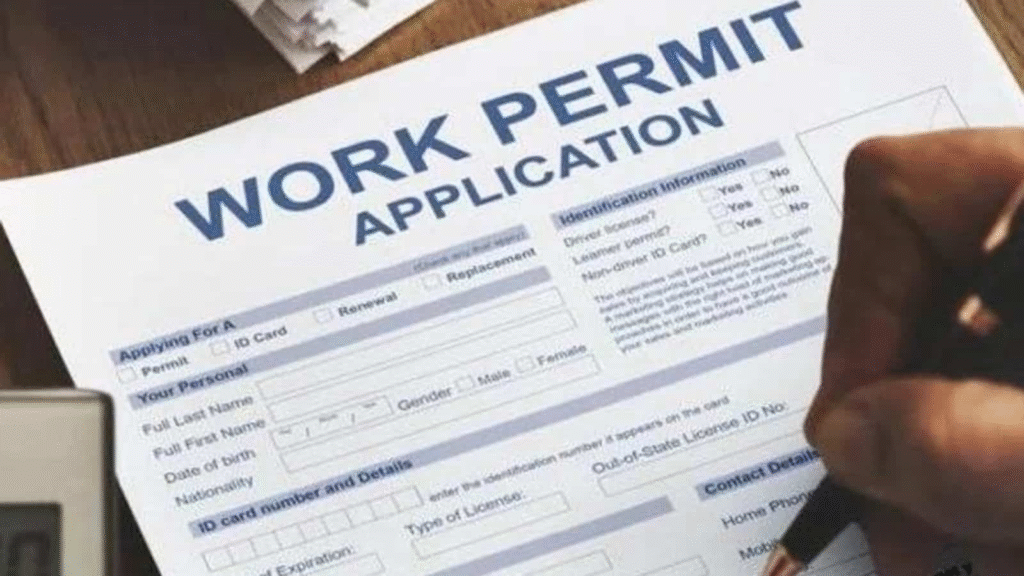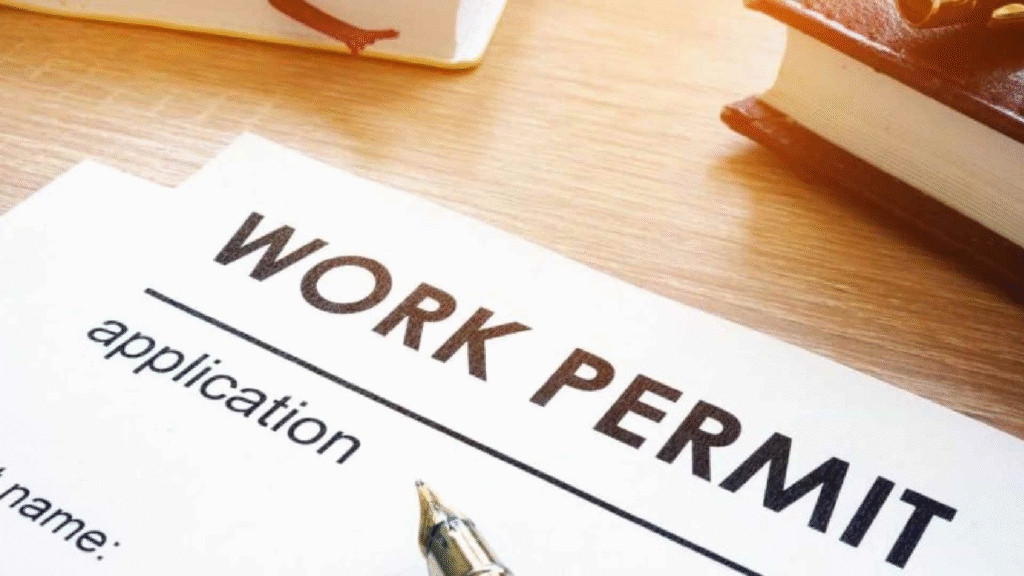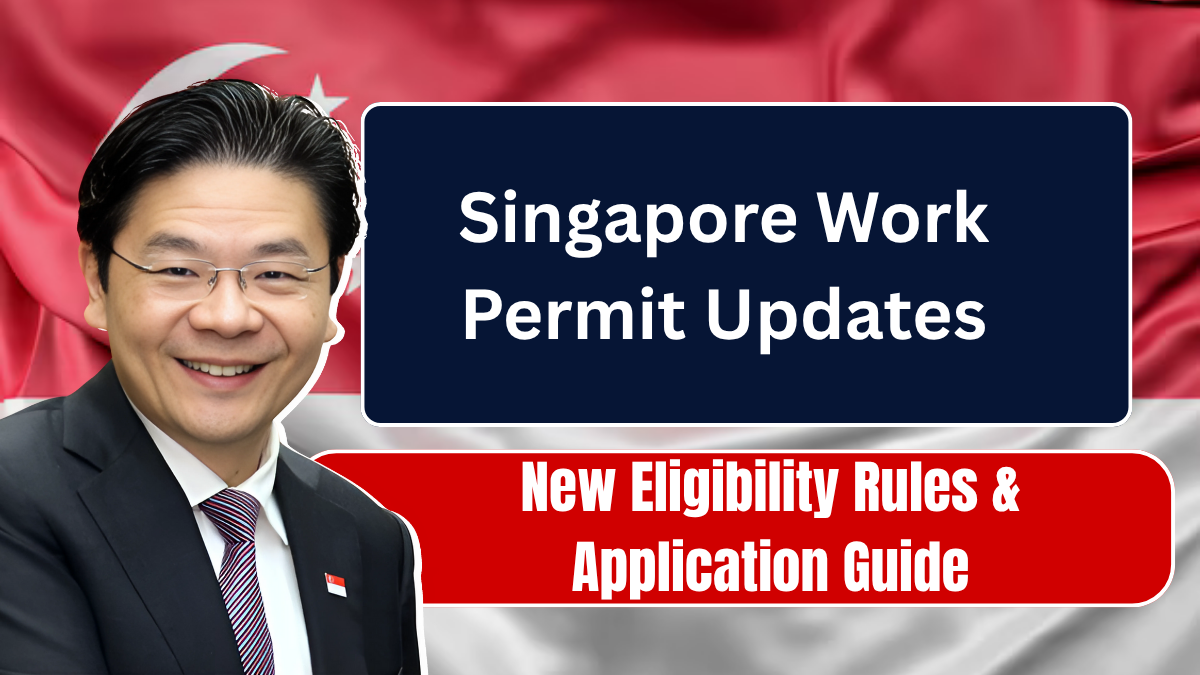Singapore has long been a hub for global talent, attracting skilled and semi-skilled foreign workers across multiple industries. The government continually updates its work permit regulations to ensure a fair labor market, safeguard local employment opportunities, and maintain economic competitiveness. In 2025, several significant changes to Singapore’s Work Permit system were introduced, affecting eligibility, application procedures, and compliance requirements. This guide provides a complete overview of these changes, eligibility criteria, step-by-step application process, and practical advice for employers and foreign workers.
Understanding the Singapore Work Permit
What Is a Work Permit?
A Work Permit (WP) is a type of visa issued by the Singapore Ministry of Manpower (MOM) that allows foreign nationals to legally work in Singapore in certain sectors. These sectors include:

- Construction
- Manufacturing
- Marine
- Services
- Domestic work
Unlike the Employment Pass (EP), which is designed for highly skilled professionals, the Work Permit is aimed at semi-skilled and lower-skilled foreign workers.
Importance of the Work Permit System
- Ensures compliance with local labor laws
- Maintains fair employment practices
- Tracks foreign workforce quotas to protect Singaporean jobs
- Facilitates efficient labor deployment across industries
Key Changes to Work Permit Eligibility in 2025
Singapore’s government has recently implemented updates to eligibility criteria, reflecting evolving labor needs and economic priorities.
Age Limits
- Previous age limits: Typically, 18–50 for male foreign workers in most sectors.
- New changes (2025): Age limits are slightly extended in certain sectors, such as domestic services, to allow flexibility for older skilled workers.
- Employers must still adhere to sector-specific age caps.
Educational Qualifications
- Earlier, minimal education requirements existed for low-skilled roles.
- Update: Workers are now expected to demonstrate basic literacy and numeracy skills, verified through certificates or testing.
- Certain sectors may require additional skills certifications, especially in manufacturing or marine industries.
Medical and Health Requirements

- Health checks are mandatory to ensure foreign workers are fit for the job.
- New rules (2025):
- Mandatory annual medical screenings for workers in high-risk industries
- Workers with certain communicable diseases may be restricted from entering or require additional clearance
Sector-Specific Quotas
- MOM regulates foreign worker quotas in specific industries to prioritize local employment.
- New adjustments include:
- Reduced quotas for low-wage service sectors
- Flexible quotas in sectors facing labor shortages, e.g., construction during high-demand periods
Who Is Eligible for a Singapore Work Permit?
Eligibility depends on several factors, including nationality, sector, skills, and compliance history.
Nationality Restrictions
- Only workers from approved source countries can apply.
- Certain countries are pre-approved for domestic work, while others are restricted.
- MOM periodically updates the list of eligible nationalities.
Work Experience
- Minimum work experience requirements vary by sector:
- Construction: 1–2 years of experience in relevant roles
- Manufacturing: 1 year of relevant experience
- Domestic work: Prior employment in domestic services
Financial Requirements for Employers
- Employers must meet minimum financial thresholds to hire foreign workers.
- Compliance includes paying the foreign worker levy, which varies based on sector and worker category.
Step-by-Step Work Permit Application Process
Step 1: Employer Registration
- Only licensed employers can apply for Work Permits.
- Registration requires:
- Valid business registration number
- Compliance with prior foreign worker quota obligations
- Payment of required levies
Step 2: Submitting the Work Permit Application

- Employers submit applications via MOM’s online system.
- Required documents:
- Copy of passport
- Proof of qualifications and experience
- Job offer letter or contract details
- Relevant health and vaccination certificates
Step 3: Approval in Principle (AIP)
- MOM reviews applications and issues an Approval in Principle if the criteria are met.
- AIP includes:
- Work Permit duration
- Sector-specific conditions
- Medical clearance requirements
Step 4: Medical Examination
- The worker must undergo a medical check-up at a MOM-approved clinic.
- Tests typically include:
- Tuberculosis screening
- Hepatitis B test (for high-risk sectors)
- Physical fitness assessment
Step 5: Issuance of Work Permit
- Once medical clearance is approved, MOM issues the official Work Permit card.
- Work Permit is linked to:
- Employer
- Job sector
- Duration of employment
Step 6: Reporting and Compliance
- Employers must notify MOM of:
- Changes in employment status
- Termination or transfer
- Renewal applications
Work Permit Duration and Renewal
Duration
- Standard Work Permit durations: 1–2 years, depending on sector and nationality.
- Employers may apply for shorter or longer permits under special conditions.
Renewal Process

- Renewal applications require:
- Proof of continued employment
- Updated health clearance
- Compliance with foreign worker levy obligations
Early Termination and Re-Employment
- If a worker leaves before permit expiry:
- The employer must notify MOM within 7 days
- The worker may be eligible for re-application under a new employer, subject to quota availability
Work Permit Levy and Fees
Foreign Worker Levy
- Employers pay a monthly levy for each foreign worker.
- Levy varies based on:
- Sector (e.g., construction, domestic services)
- Skill level and nationality
- Duration of employment
Additional Fees
- Application processing fee for new permits
- Medical examination costs
- Renewal fees for ongoing employment
Financial Planning for Employers
- Budgeting for levies and fees is crucial to avoid compliance violations.
- Non-payment can result in fines, permit revocation, or blacklisting of employers.
Compliance Requirements for Employers
Workplace Safety
- Employers must provide safe working conditions in accordance with Workplace Safety and Health (WSH) guidelines.
- Mandatory safety training for high-risk sectors like construction and marine.
Housing Requirements
- Employers providing accommodation must meet MOM housing standards.
- Overcrowding or unsafe housing can lead to fines or permit suspension.
Reporting Obligations

- Employers must report:
- Workplace injuries
- Criminal offenses
- Absconding or non-compliant workers
Penalties for Non-Compliance
- Failure to comply may result in:
- Fines up to S$10,000 per violation
- Suspension or revocation of Work Permit privileges
- Restrictions on hiring future foreign workers
Common Mistakes to Avoid
- Hiring without verifying eligibility
- Missing levy payments or deadlines
- Neglecting mandatory medical checks
- Improper housing arrangements
- Failing to report changes in employment status
Avoiding these mistakes ensures a smooth application process and minimizes legal risks.
Benefits of the New Changes
Improved Worker Protections
- Mandatory health checks and housing standards improve worker well-being.
Better Labor Market Regulation
- Adjusted quotas and eligibility rules protect local employment while filling critical labor gaps.
Simplified Application Process
- Online submission and structured procedures reduce administrative delays for employers and workers.
Transparent Compliance
- Clear rules and penalties enhance accountability and fairness in foreign worker management.
Challenges and Considerations
Sector-Specific Labor Shortages
- Sectors with strict quotas may face temporary worker shortages, impacting project timelines.
Compliance Costs
- Employers must budget for levies, housing upgrades, and medical checks, increasing operational costs.
Adaptation to Policy Changes
- Frequent updates require employers to stay informed to avoid violations.
Worker Awareness

- Some foreign workers may lack understanding of new eligibility rules, requiring employer guidance.
Tips for Employers and Workers
Employers
- Regularly check MOM announcements for updated rules
- Ensure accurate documentation and online applications
- Maintain proper worker accommodation and safety standards
- Monitor levy payments and deadlines
Workers
- Verify that your employer is licensed
- Complete mandatory health checks on time
- Understand work permit duration and renewal process
- Keep copies of employment contracts and official permits
Future Outlook
Continued Reforms
- Singapore’s Work Permit system will continue to evolve to balance:
- Local workforce protection
- Economic growth
- Worker safety and rights
Digitalization
- MOM is expanding digital tools for applications, tracking, and compliance monitoring, streamlining processes further.
Sector Adjustments
- Industries like construction and domestic services may see periodic quota updates based on labor demand.
Conclusion
The 2025 updates to Singapore’s Work Permit system reflect a careful balance between protecting local employment and meeting the country’s labor needs. Both employers and foreign workers must understand:
- Eligibility changes, including age, education, and health requirements
- Application process steps, including medical checks and approvals
- Compliance obligations for housing, safety, and levy payments
- Strategic planning to optimize workforce deployment
By staying informed and adhering to the updated regulations, Singapore can continue to maintain a safe, fair, and competitive labor market for all parties involved.
These changes may seem complex, but with proper preparation, documentation, and adherence to regulations, the Work Permit system can operate smoothly, benefiting both employers and foreign workers in Singapore.
FAQs:
Can I apply for a Work Permit if I am over the age limit?
No, age limits are strictly enforced, though some sectors have extended limits for older skilled workers.
How long does the application process take?
Typically 1–4 weeks, depending on sector and completeness of documentation.
Are Work Permits transferable between employers?
Not directly; workers must have a new employer submit a fresh application.
Can I work in Singapore while my Work Permit is being processed?
No, employment can only commence after official issuance.
